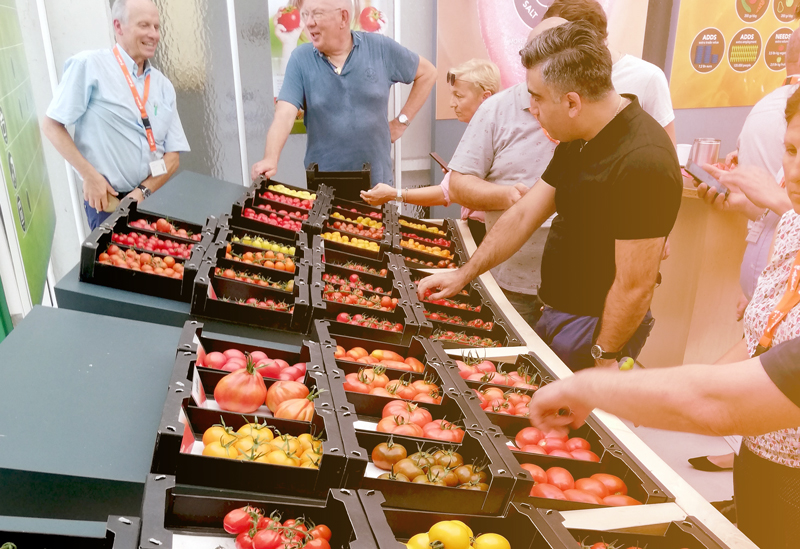Regional initiative has eye on high-value markets for horticultural producers

There are distinct advantages to growing fruits and vegetables in greenhouses – like protection from extreme weather, less need for chemical inputs and good quality produce with a longer shelf-life and market appeal, to name a few.
Georgia, Moldova, Tajikistan and Uzbekistan all have ideal climates for growing produce in greenhouses.
Thanks to an initiative by FAO and the European Bank for Reconstruction and Development (EBRD), horticultural producers in the four countries are getting support to modernize their production practices and access high-value markets
One way is by exposing them to the latest production trends and technologies via international study tours.
Supported by the European Union through its EU4Business initiative, the EBRD and FAO organized a greenhouse study tour in August to Ukraine for fruit and vegetable growers from all four countries. This was immediately followed by a similar exchange to the Netherlands for Georgian and Moldovan growers.
Wafaa El Khoury, an FAO Investment Centre service chief, said that such visits give producers “a chance to learn from their peers and leaders in the greenhouse industry and also to make valuable contacts, whether with input suppliers or wholesalers or growers who are marketing their produce in innovative ways.”
Eye-opener
The initiative’s overall goal is to strengthen the countries’ respective agribusiness sectors, said Natalya Zhukova, EBRD Director for the Agribusiness sector. Over the years, the Bank has become one of the largest investors in agribusiness projects in the countries.
“Upgrading their operations can help these growers optimize production and add value to their produce to satisfy domestic demand and possibly access export markets,” she said. “This can translate into higher earnings and greater investment along the entire supply chain, from primary production to cooling, packaging, sorting and trade.”
The Ukrainian study tour was organized by Fruit-Inform and supported by FAO and the EBRD with Moldova’s FARM Federation and the Ukrainian Horticultural Association.
While visiting greenhouse farms in southern Ukraine, the delegation saw how changes in growing and handling techniques could secure higher tomato and cucumber yields.
The delegation also attended an international conference with a focus on global greenhouse business trends and opportunities, especially in Eastern Europe and Central Asia, and greenhouse technologies for traditional and niche crops.
The Government of the Netherlands co-sponsored the Dutch study tour organized by FAO and the EBRD.
Over five days, the Georgian and Moldovan delegation visited greenhouse producers, manufacturers, research centres, input suppliers, supermarkets and family-owned companies.
They toured the World Horti Center in the Netherlands, for example, a modern research facility that champions innovation in greenhouse technology, cultivation systems, crop protection and breeding
For Ion Vladei, a Moldovan vegetable farmer and member of the FARM Federation, the study tour was an eye-opener.
“In the Netherlands, we discovered a world that sets the ‘rules of the game’ in the global vegetable sector,” he said. “Everything is automated, interconnected and aligned for maximum efficiency, from the construction of greenhouses to vegetable growing to sales. And Dutch farmers are able to get up to 100 kg of vegetables per square metre.”
Sustainability
Dutch greenhouse companies are also leading the way in terms of sustainable, environmentally-friendly cultivation.
During a visit to Tomato World held in the country, the Georgian and Moldovan delegation saw and even tasted some of the 80 different tomato varieties on hand. They learned innovative ways to grow greenhouse tomatoes, from smart-censoring to collective irrigation water treatment.
Georgian vegetable producer Besik Tetvadze, for one, is feeling inspired to alter the way he uses water to grow tomatoes.
“I’ve realized that in Georgia we use at least twice as much water for production than the Dutch producers, who re-cycle their water, reducing both water and fertilizer costs,” he said.
Ongoing support
To date, more than 20 events have been held in the four countries via the EBRD/FAO initiative, sparking new investment interest in modern horticultural production. The next trade forum and investment conference will take place in Moldova on 15th October coupled with a field visit to apple farms.
The EBRD and FAO will continue to support east-fruit.com, an interactive platform managed by several horticultural associations. The platform provides up-to-date market information to growers and traders for more informed decision-making, as well as technological information.
